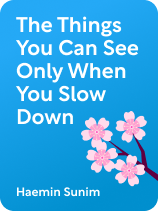

This article is an excerpt from the Shortform book guide to "The Things You Can See Only When You Slow Down" by Haemin Sunim. Shortform has the world's best summaries and analyses of books you should be reading.
Like this article? Sign up for a free trial here.
What are the benefits of slowing down in life? What do relationships have to do with mindfulness?
In his book, The Things You Can See Only When You Slow Down, Haemin Sunim explains how when you use mindfulness, you begin to see things that were invisible before. In slowing down, you start to fully appreciate what matters in life.
Here’s a look at the things you’ll start to see once you slow down in life.
1. The Value of Humility
The first benefit of slowing down is that you’ll begin to see the value of humility in navigating both your professional and personal life.
In professional settings, humility transforms the workplace dynamic by encouraging collaboration instead of competition. By allowing you to acknowledge the contributions of every team member and recognize your mutual dependence, humility counters the often relentless pursuit of personal success. This shift in perspective not only enhances workplace productivity and satisfaction but also cultivates a healthier, more cooperative environment.
(Shortform note: While humility can foster a more collaborative and satisfying work environment, it’s important to recognize that being too humble might have unintended consequences, especially for women. In many professional settings, women already face the challenge of being underestimated or overlooked. Excessive humility might exacerbate this issue by making them less likely to assert their achievements and capabilities. This could limit their visibility and chances for advancement within a company. Therefore, while embracing humility, experts say it’s crucial for everyone, especially women, to balance their humility with self-advocacy to ensure their contributions are seen and acknowledged.)
Humility also enriches your personal relationships. Haemin emphasizes the importance of approaching all relationships with curiosity and the belief that everyone has something to teach you, regardless of their background or beliefs. This attitude breaks down barriers and opens you up to the diversity of human experiences and wisdom. By remaining open and humble, you can enrich your relationships, gaining a deeper understanding and appreciation for the people in your life.
(Shortform note: Brené Brown argues that curiosity is crucial for effective conflict resolution. By genuinely seeking to understand others’ perspectives and asking respectful questions, we acknowledge that our viewpoint is just one of many valid experiences. This approach challenges assumptions, fosters empathy, and promotes inclusivity. Brown emphasizes that vulnerability leads to more meaningful dialogue by creating space for authentic sharing and modeling openness to learning. When we admit uncertainties, we invite deeper conversations and break down power dynamics. This process requires intentional listening, patience, and a willingness to set aside biases.)
Most importantly, Haemin explains, humility helps you recognize the limitations of your control. Haemin argues that when you acknowledge that you can’t control everything, you start to reconsider what truly matters because you begin to focus your energy and attention on aspects of life within your influence. This realization makes you less anxious over uncontrollable circumstances, fostering a more profound appreciation for the present moment.
(Shortform note: Astrophysicist Neil deGrasse Tyson suggests that if you want to become more humble and better understand your limitations, you should start with the study of astrophysics. In Astrophysics for People in a Hurry, he argues that the vastness of the universe reminds us that people aren’t the center of everything and that there’s so much that’s beyond our control.)
2. The Importance of Relationships
When you slow down, you’re better able to recognize the things that bring value to your life. For Haemin, nurturing connections and building relationships is key to finding happiness and understanding yourself. He believes that relationships are crucial because they offer a mirror through which we can see ourselves more clearly, highlighting both our strengths and areas for growth. They ground us, providing comfort during tough times and joy in the good ones while fostering a sense of belonging and community. Essentially, Haemin underscores that by connecting deeply with others, you remind yourself that you’re not alone but part of something bigger than yourself.
(Shortform note: Prioritizing your social ties improves more than just your connections. According to Marta Zaraska, author of Growing Young, nurturing social connections not only enhances emotional well-being but also improves physical health and longevity. Her research shows that people with strong relationships have a significantly lower risk of premature death. Moreover, engaging in acts of kindness and maintaining social bonds can decrease inflammation and stress levels, contributing to better overall health.)
Haemin adds that to maintain strong relationships, you need to find a balance between intimacy and independence. Too much of either can lead to feelings of suffocation or isolation, respectively. For example, a parent who keeps their teenager on a very tight leash might think they’re being protective, but it can lead to the teen feeling stifled and craving independence. Or, on the flip side, giving the teen too much freedom without enough check-ins can leave them feeling neglected and unloved.
(Shortform note: This delicate balance isn’t exclusive to parent-child dynamics but extends to romantic relationships as well. Esther Perel’s insights in Mating in Captivity deepen our understanding of the importance of intimacy and independence in romantic relationships. Perel emphasizes how this balance affects sexual attraction and long-term desire. She argues that maintaining individuality not only prevents suffocation but also preserves the mystery and excitement that draw couples together. By allowing each partner space to grow, the relationship benefits from sustained intrigue and attraction.)
Haemin adds that to have healthy relationships, you must learn how to forgive. Forgiving someone for their mistakes allows you to move forward without being burdened by resentment or emotionally tied to past grievances or conflicts.
| Should We Forgive People—or Cancel Them? Cancel culture is the ostracism and public shaming of people for perceived wrongdoings. Critics of cancel culture, like philosopher Lucy Allais, argue that cancel culture neglects the importance of forgiveness and rehabilitation. She believes that cancel culture can overlook the potential for individuals to learn from their mistakes and change for the better. Allais asserts that forgiveness and accountability are not mutually exclusive but can coexist. Accountability involves recognizing and addressing harm, while forgiveness allows for personal growth and reintegration into the community. However, some activists, like Roxane Gay, reframe the idea of cancel culture as consequence culture, arguing that it’s a crucial mechanism for marginalized communities to hold powerful figures and institutions accountable. Gay contends that traditional avenues of accountability often fall short or are inaccessible, so the public pressure inherent in cancel culture may be necessary to prompt meaningful change. |
3. The Gift of Each Moment
Slowing down, Haemin explains, also allows you to be fully present. This makes it possible to appreciate the value of each moment, whether it brings joy or heartache. He argues that in our high-speed world, we often find ourselves rushing from one task to the next, so caught up in our responsibilities and digital distractions that we miss the intricate details and simple pleasures that surround us.
(Shortform note: Haemin’s perspective resonates with the Buddhist concept of impermanence, which asserts that everything changes and only the present is real. The past is no longer accessible, existing only in often-distorted memories, while the future is uncertain and unknowable. Both are mental constructs rather than experiential realities. Acknowledging impermanence fosters an appreciation of and focus on the present moment, reducing any attachment to non-existent past and future moments.)
Slowing down allows you to create the space needed for deeper reflection, which in turn brings clarity, especially during difficult times. Haemin emphasizes the importance of gracefully accepting life’s ups and downs—understanding that joy and sorrow are interconnected. Slowing down is not about avoiding challenges; rather, it’s about confronting them with mindfulness and compassion toward ourselves and others. In adopting this gentle approach, you can find significance in both hardships and joys, seeing them as essential elements of life’s richness that offer opportunities for learning and growth.
(Shortform note: In Bittersweet, Susan Cain argues that experiencing periods of grief or loss are inevitable and can also enrich your life in meaningful ways. For example, she argues that sadness is a powerful catalyst for introspection and artistic expression. By embracing sadness rather than shunning it, individuals can access deeper levels of empathy and understanding, connecting more profoundly with others who share similar experiences. Cain posits that this emotional depth can lead to stronger communal bonds and innovative thinking, as people who understand their own complex emotions are better equipped to create resonant works of art and forge meaningful relationships.)
4. Your Place in the World
Finally, Haemin explains, when you slow down, you’re better able to listen to your inner voice and give yourself the space to understand what motivates you. Slow living affords you the time to reflect on your experiences, recognize what brings joy, and understand the unique contributions you can make to the world. When you follow your own passions instead of chasing external validation, your life will be richer and more rewarding.
| Find Your Ikigai Ikigai is a Japanese concept that translates to “reason for being” or “purpose in life.” It represents the source of value in one’s life, or the things that make life worth living. Ikigai is often depicted as the convergence of four fundamental elements: 1. What you love (Your Passion) 2. What you’re good at (Your Vocation) 3. What the world needs (Your Mission) 4. What you can be paid for (Your Profession) At the intersection of these elements, according to this philosophy, lies fulfillment, satisfaction, and a sense of purpose. Ikigai is deeply embedded in Japanese culture and is a holistic approach to finding personal and professional meaning. |
However, Haemin suggests tempering your enthusiasm when you pursue your passion to prevent potential conflicts or burnout. He argues moderation is crucial to ensure that your pursuits remain fulfilling and sustainable. By managing your enthusiasm, Haemin writes, you can ensure that your passions enrich your life without depleting your energy or straining your relationships.
| Three Types of Burnout and How to Avoid Them While Haemin advocates for moderation of your passion to avoid burnout, Ali Abdaal (Feel Good Productivity) identifies three distinct types of burnout, each requiring a different set of strategies to prevent and address. Strain burnout occurs when you’re overwhelmed with more work than you can handle, leading to decreased productivity and deteriorating mental health. To combat this, Abdaal recommends prioritizing tasks wisely, recognizing your limitations, and minimizing distractions. Drain burnout results from inadequate recharging. Abdaal emphasizes the importance of restorative downtime, encouraging activities that replenish your energy without further depleting mental resources. Mismatch burnout arises when there’s a disconnect between your work and personal values or interests. This type of burnout highlights the importance of aligning your professional life with your core values and passions. By understanding these different forms of burnout and implementing targeted strategies to address them, you can maintain productivity while preserving your mental well-being. |

———End of Preview———
Like what you just read? Read the rest of the world's best book summary and analysis of Haemin Sunim's "The Things You Can See Only When You Slow Down" at Shortform.
Here's what you'll find in our full The Things You Can See Only When You Slow Down summary:
- Why we feel continuously busy and overwhelmed
- How embracing slowness can lead to increased self-awareness and contentment
- The importance of curbing your enthusiasm when pursuing your passion






